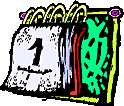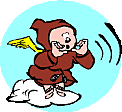With The Commentary of the RABAM

She Bears Seed
This week’s parsha, Tazria, is about animal sacrifice, much like the rest of Sefer Vayikra. Take the goat. Cut its neck. Sprinkle the blood. Smoke the meat. Serve it with fries and a nice red wine. DO NOT have ice cream for dessert. And whatever you do, for Reboinoisheloilum’s sakes, don’t be mezaneh with your father’s sister!
Goat = Excellent if curried, having a dense and flavourful meat. Young goat should be gently cooked, whereas a mature animal benefits from a fierce braise followed by moist cooking. Whole peppercorns and cinnamon stick are good additions to the pot, as are bay leaves and some nice hot peppers. As with many animals wich have a reputation for gaminess or strong flavour, French fries are a lovely and customary accompaniment.
Do not have ice cream for dessert = fresh fruit is better for the digestion. Trust me. Postpone the cheese course for at least six hours.
“Mezaneh with your father’s sister” - Why is this mentioned? Because gamey meat excites passion, and wine clouds judgement.
And so on. And so on. Week after week. Not that I’m complaining, chas v’shalom, but if Karbanois were so important to the Aimishteh, why don’t we do them today? We’re worthy! Look—we have many children, lots of Yeshivas, kosher gummy bears, and Spongebob Squarepants yarmulkas. We give tzedakah, provided the information gets sent around to everyone we know in a newsletter. We cheat on our taxes. What does Hakkadoshboruchhu have against our generation?
Chas ve shalom = Literally: desist and peace; may we have peace. Like chas ve chalilah (desist and far away: may we be spared). Chat (chas)has the same root as chata (crime), meaning a forfeit, an expatiation, something to desist, something to penalize. Chalilah, used idiomatically to express that something should be apart, refers to taboos. Both chas ve shalom and chas ve chalilah are used like ‘heaven forbid’.
Karbanos, korbanos = sacrifices, from a Semitic root meaning ‘to draw near’, which also gives cherub, cherubim (krub, pl.: kerubim - those who are near, the near ones).
Yeshiva = Jewish school or academy where Torah and Talmud are taught.
Kosher gummy bears = gummy bears made with gelatin from kosher animals or fish, or with gelatin substitutes from kosher sources. As always, consult your rabbi, or look for the marking (Heksher) of a trusted kashrus certifying agency.
Spongebob Squarepants Yarmulkas = What!?!?! You didn’t know he was Jewish!?!?
Reb Elisha Ben Abuya once asked this deep philosophical question. Unfortunately, just as he was about to answer it, he became obsessed with his bris milah. So he’s no help.
Reb Elisha Ben Abuya = The Acher (the other), fourth of three musketeers during Roman times. All four saw paradise - Ben Azai, Ben Zoma, Elisha ben Abuya, and Rabbi Akiva. Ben Azai saw the glory of HaShem and died, Ben Zoma lost his marbles, Elisha ben Abuya became a heretic. Only Rabbi Akiva was unaffected. But another account (in the Talmud, Mesekhes Kiddushin) relates that Elisha Ben Abuya once saw a boy on a ladder raiding a bird’s nest as he was instructed to do by his father. The boy removed the mother bird, then accidentally fell from the ladder and died. This caused Elisha to doubt scripture, because it is written that one who obeys his parents, and one who removes a mother bird before taking her young (so that she does not suffer the sight of her children being taken) will both enjoy long life.
Bris Milah = the place or locus of the covenant, being a precise part of a male private part.
When you look at Karbanois, you can definitely see the importance of personal sacrifice to the Reboinoisheloilum, represented by the shedding of blood. On the other hand, you would think that burning the fat, bringing up the smoke and the rest of the ritual was pretty unpleasant, if you know what I mean (not unlike the Bais Medrish with the air conditioning broken during Elul Zman).
Blood = symbolic of life-force, and thus not permitted as food for man. But blood and other fluids are also potent substances that transfer purity and impurity between things, as is shown by the many changes of status that follow contact with such fluids, as for instance with the parah adumah, or during the menses and giving birth. The fat of an animal is what gives the meat flavour, and may be considered the essence of the beast.
Elul zeman = the height of summer, the month of Elul, starting forty days before Yom Kippur (the day of atonement, marking the third time Moses ascended Mt. Sinai at the beginning of Elul (Rosh Chodesh Elul), when people prepare for the coming High Holy Days and seek forgiveness. Between eighty and a hundred and ten degrees Fahrenheit, until long after sunset.
Bais madrish, Beis medresh = a house of study, a synagogue.
So where did Karbanois go? According to Rabbi Yehuda Hanasi, sacrifice is no longer required in the post Temple era. In our day, Karbanois have been replaced by Tefilla—prayer. He points to the prayer liturgy which mirrors the Temple’s sacrifices, the congregational singing which emulates the musical prelude of the Levyim (the Temple Levites), and the strict culture of mentorship instituted by the Koihanim in the Bais Hamikdash, which has been succeeded by the rampant psychological, physical and sexual abuse instituted by many of our community rabbis. Shoyn.
Rabbi Yehuda Hanasi = Judah the prince (135 - 219), redactor of the Mishnah, also called simply Rabbi, or Rabbeinu HaKadosh (our holy master). One of the major figures in Jewish history.
Bais HaMikdash = the holy temple, destroyed by the Romans (Titus, 70 CE) on the ninth of Av, which date marks the end of the three ghastly weeks that start with the seventeenth of Tammuz, but the beginning of Rabbinic Judaism.
Rampant abuse = Greek and Roman tendencies, which must be resisted at all costs (remember Chanuka!). Be especially careful of creepy gentlemen using the mikvah, and of scholars with red kippot.
The RAMBAM, commenting on Rabbi Yehuda Hannassi’s position, notes that in the post Temple era, the notion of prayer has driven a universalization of Toirah values. One no longer needs to make a pilrimage to the Temple in Jerusalem to communicate with the Aimishteh. Rather, one may speak to Hakkadoshboruch at the local synagogue, converse with the Reboinoisheloilum in one’s own home, and plead with the Aimishteh from Yankee stadium when the Yankees are down by three runs in the bottom of the ninth.
The RAMBAM = Rabbi Moses Ben Maimon, a physician and scholar who left Spain under a cloud and settled in Egypt. A prodigious writer of commentary and ellucidations, author of the Guide For The Perplexed and the Mishne Torah.
Ever since the destruction of the Temple, worship has shifted from sacrifice to prayer, and Hashem listens even to a single person praying anywhere. How do we know this? Because it is written (Shemos 20:21) be-khol ha makom asher atzkir et-shemi avo eleikha u-verakhtikha (in every place where I cause My name to be mentioned I will come to you and bless you). This applies also to shuls and stadia. Yankee Stadium = a place where many people achieve religious insight; amidst the multitude you shall be alone and pray.
The Tzitz Eliezer takes this notion even further. He notes that in our day, prayer has become a common form of worship, even amongst the Goyim, and has united the world in its worship of Hakkadoshboruchhu. Pointing to Evangelical Christians in the United States, the Tzitz notes, “I see Pat Robertson on the 700 Club, and he has no less Kavanah that I do. Plus he has a much nicer suit.”
Similarly, he notes that Pope John Paul II had a much bigger Yarmulka than most of the buchrim in his Yeshivah, and, in his words, “had a lot more impact on the world than those of us worried about whether or not lettuce and drinking water are traif because of microscopic organisms.”
Tzitz Eliezer = The nickname of prolix Rabbi Eliezer Yehuda Waldenberg,a major modern halachic authority, from his writings (multiple volumes) by that name.
HaKadoshBoruchHu = The holy one, blessed be he (Hashem).
Evangelical Christians = for there is no place where they are not. They grow to great size in New York, but you should see the ones in the tropics that occasionally come in on crates of ripe fruit. Huge!
Kavanah = the right intent for the action one is going to perform; a spirit of sanctity and holiness one must invest in one’s tefillah and ones avoidah.
“A much nicer suit” = Of course he does! Shatnez, no tzittzits!
Buchrim = the plural of bocher (a young man, a virgin and a shy fellow).
Microscopic organisms = one must closely examine certain foods like cereals, kitniyot, and whole spices, lest one unknowingly include something unkosher (e.g., an insect) in the pot. But a reasonable amount of care is all that is required - we are neurotic enough already, no need to get anal-retentive (hiddur mitvah). But if you want to, go ahead. Who’s to stop you?
The Shvantz Mordechai, however, argues vehemently with the Tzitz. Regarding the Pope, the Shvantz says, “so what if saved Jewish lives, went to a shul in Rome, established diplomatic relations with Israel, came to Yad Vashem, or was friends with the Chief Rabbi in Rome. His real motive was that he was interested in getting free macaroons the week after Pesach and discounted admission to the mikvah.”
Shvantz = a Yiddish word for a part of the male body.
The Mordechai = One of the Rishonim (early scholars, commentators, and sages), a possek (judicial decider or authority) whose decisions are referenced in the Aruch HaShulchan.
Yad Vashem = the memorial to the six million.
Macaroons = If made with ground almonds and whipped eggwhite, without any flour whatsoever, they are appropriate for post-peysach noshing.
Mikvah = be especially careful of creepy men using the mikvah and of scholars with red kippot.
However, I am troubled about this basic approach. The notion of prayer as a substitute for Korbanois in our day is misguided. Let’s face it—with animals screaming at their throats being cut, the sizzle of the fire consuming the sacrifice, and the deep, aromatic smoke, no one would ever fall asleep in the Bais Hamikdash. But have you ever been to a shul where half the Kehilla was NOT asleep by the second aliya?
It is one of the more inexplicable oversights that coffee is not a mitzvah. Had Moishe Rabbeinu not been such an insufferable morning person, this never would have happened. Be aware of people who are wide awake and cheerful that early - they probably did something nasty during the night. But the solution is to have a synagogue-sized coffee maker with a timing device (to be set before sundown on Friday afternoon, so as to avoid desecrating the Sabbath. You should like your coffee black). Just imagine how many more people would come to shul if they were lured by an inviting aroma?
Rather, I would humbly like to suggest an alternative approach, based on this week’s Parsha, Parshas Tazria. In Tazria we learn that after a woman gives birth, she is considered to be in Nidah for so long, it’s as if she has Niagra Falls going on between her legs. And, we should note, the whole concept of Nidah has not changed much since the days of Aron Hacoihain.
Tazria = She bears seed.
Nidah = Blood blood blood blood blood! Ritual impurity (tuma) of a woman during the menses, or after having given birth, and also the menstrual woman herself. It is defined by a discharge of blood (dam) from the female reproductive organ. Seven days from the moment the menses (dam nidah) start are nidah. Then follow eleven days of zivah (running or radiant flow - the clean and clear flow of menstrual blood after the uterine lining has been cast off. Any bleeding during zivah is dam zivah; the zivah woman is a zavah.
But it is a different ball game (see Yankees Stadium, mentioned earlier)after giving birth. After a boy, she is impure for seven days from when vagina bleeding stops and until she goes to the Mikvah (ritual bath); after a girl, for fourteen days following the cessation of bleeding and until she goes to the Mikvah. But if she has given birth by Caesarian section and there has been no vaginal bleeding, she need not wait the seven or fourteen days - she is considered to be clean (tahor).
Please note that until the woman goes to the Mikvah she remains unclean, no matter what type of vaginal bleeding is involved.
Mikvah = Pool. In this context, a pool for the ritual cleaning or purifying of people (men also!) and things (cooking utensils!). Not just any puddle of water will do; it has to be Mayim Chayim - living water, meaning water that moves: river or lake water, streams, or pools of fresh rain water. It may however be ‘augmented’ by tap water.
When making use of a Mikvah, a woman is supposed to immerse herself entirely without holding on to anything (lest that portion of the skin in contact with the support not be wet at the same time as the rest of her).
Then the blessing (bracha) is recited: ‘Blessed art thou O Lord our G-d, King of the Universe, Who has sanctified us by His Commandments and commanded us to perform the ritual immersion’ (Baruch atah Adonai Eloheinu melech ha-olam asher kidshanu b’mitzvotav v’tzivanu al ha-tevilah).
Women MUST use a Mikvah, men MAY use a Mikvah, but are not obligated to do so. Both should wash themselves thoroughly and completely before entering the pool. Be especially careful of creepy men and of scholars with red kippot when using the mikvah.
Aron HaCohain, Aaron HaKohen = A’aron the High Priest, a man with much to answer for (egel ha zahav, shmegel ha zahav!!!).
I’ll be honest with you: when my Bashert, Feigel Breyna, is in Nidah, I feel like I’m making an ENORMOUS sacrifice—it could be Moitzei Shabbos, the children and the einiklach can be asleep, the movie “9 and ˝ Weeks” could be on my neighbor’s television (of course, I would NEVER bring such a thing into the house), but instead of riding my wife like a Shtender, I have to go upstairs and flog the flanken, if you know what I mean.
Bashert = the one who is one’s destined mate.
Moitzei Shabbos - the day after shabbos, which starts after the sun has set on Saturday night. By extension, the entire period that starts with the post-cholent-fressing nap.
Shtender = lectern or bookrest for large unwieldy tomes.
Flanken = From mediaeval French ‘flanc’, meaning side. The cut of meatfrom the short-ribs, evocative of Eve (Eve: Hava = breath, air; life-giving, demonstrating life; urges and emotions), the companion of Adam who was taken from his rib (though the word translated as rib actually means ‘side’, or, appropriately, flanken).
So the bottom line is: we still have Karbonois today, They are delivered two weeks out of every month and, like animal sacrifice, involve the spilling of blood. But instead of contributing to the sacrifice with money or with our flock, we give of our own flesh.
Karbonos - sacrifices. Two weeks out of every month = the time of a wife’s impurity, the duration of nidah, more or less.
Yes, our generation truly is worthy. So we must prepare for the End of Days. Every month we must be ready for the arrival of the Mashiach. Short of that, we must keep a box of pads lying around, just in case.
Mashiach = the anointed one, (Shekha = Oil, smear, unguent).
Maxipads - the best. Chas ve shalom she should be without. There are many fine brands. Experiment.
Ah Gutten Shabbos You Minuval




